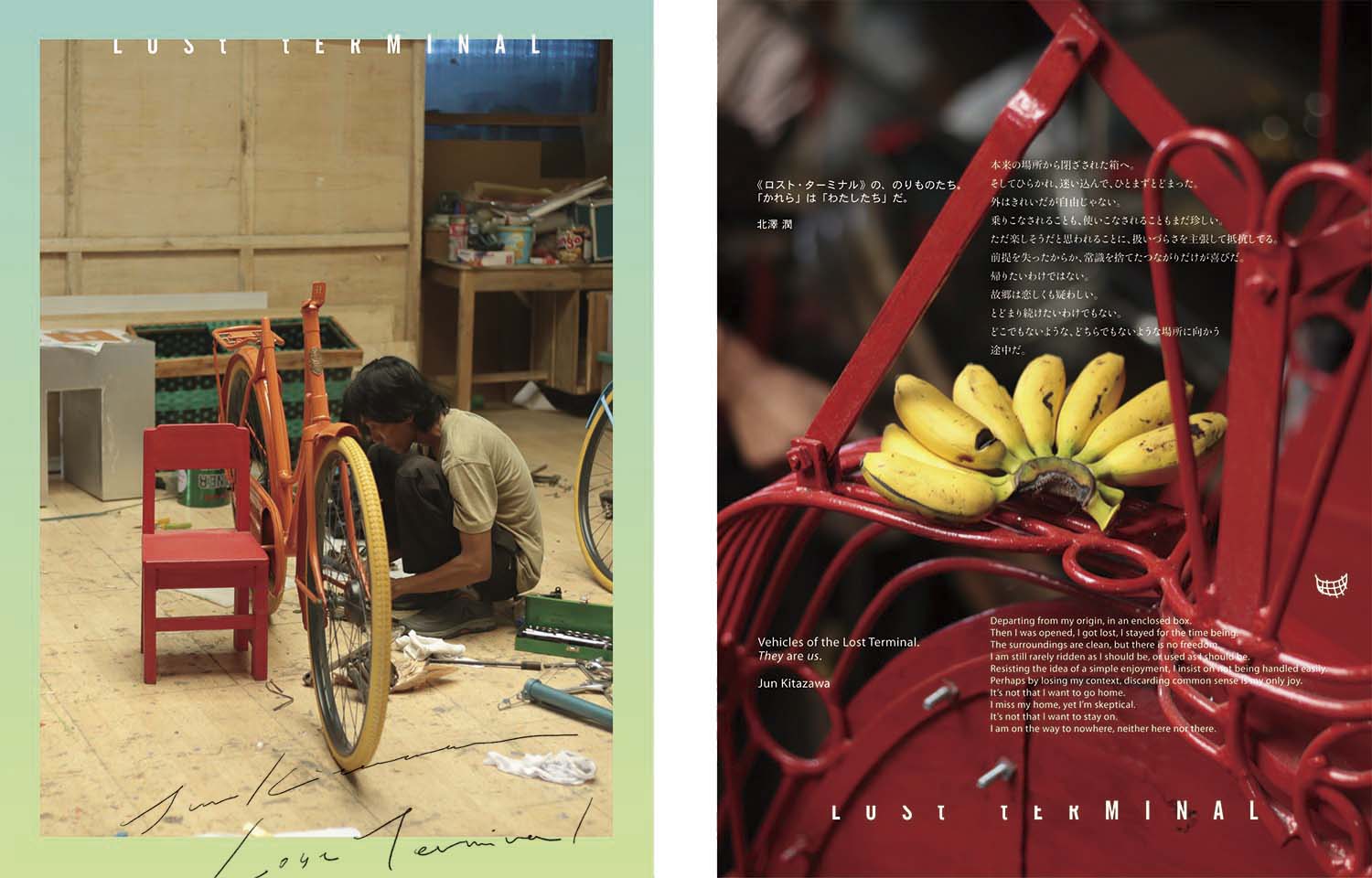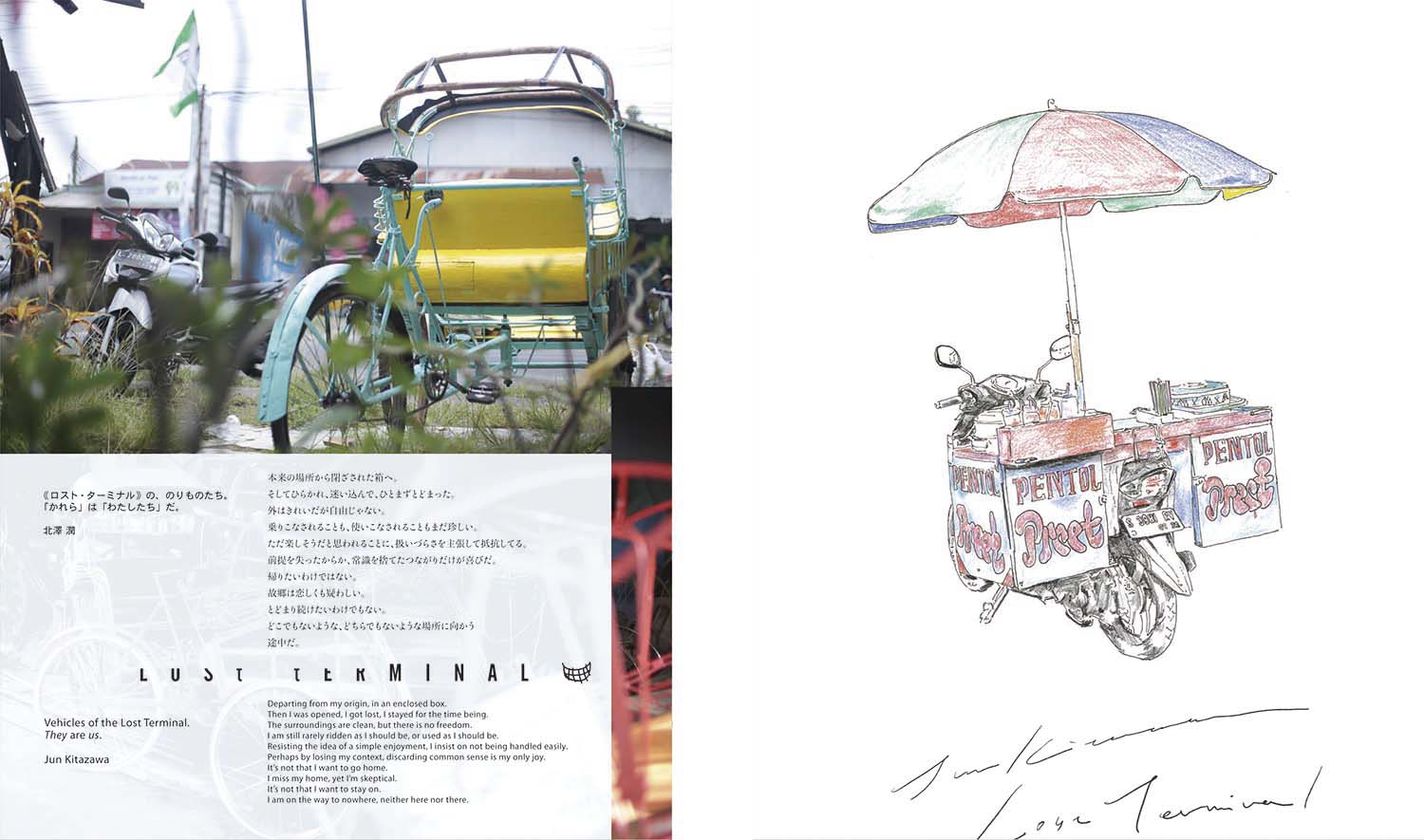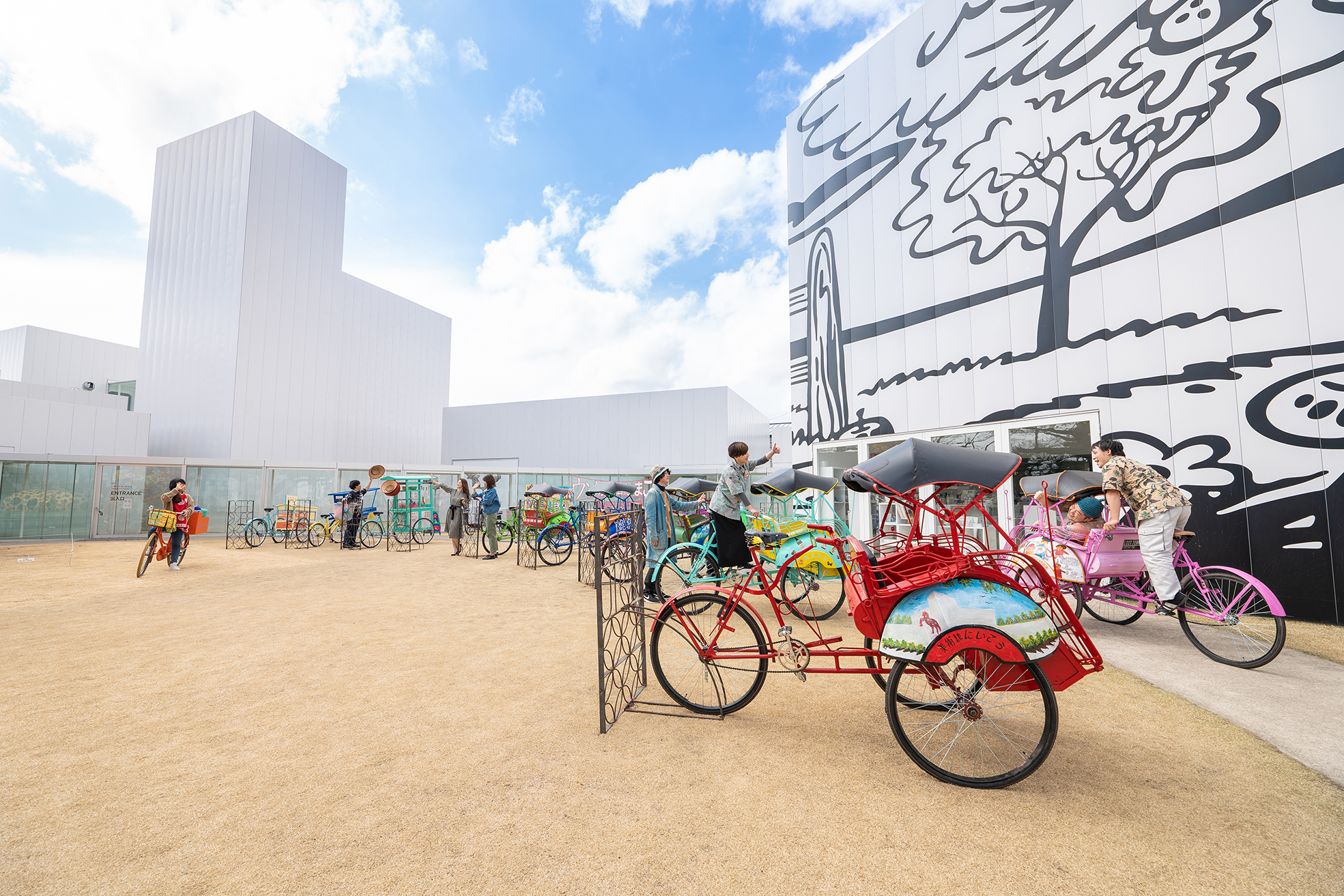
photo by Kuniya Oyamada
LOST TERMINAL
ロスト・ターミナル
Statement
Bring vehicles made in a distant country to this city, The station was fixed and named "Lost Terminal" A total of 20 vehicles are leased to certain people, get out of here by being used and come back again.
Different vehicles that are fun but difficult to handle, how will they ride and used people in this city ?
Lost.
"something what we lost" or "missing ".
Terminal.
"Destination" or "end point".
"Lost Terminal" is a "across point toward street we lost" Indonesia, Singapore, Yokohama, Hachinohe, and Towada. There is a theory that the roots of these vehicles that have repeatedly made arrivals and departures are Japan.The rickshaws exported to Asian countries during the Meiji period are still called "Rikisha" and routinely travel along Southeast Asian roads such as Thailand and India.
"Sepeda", "Gerobak", "Becak", "Andong".Vehicles with an inaudible name that are parked in front of you at the "terminal", is it really something alien and exotic to us?
In fact, one of the twenty vehicles, the "Andong", is a modification of the body that is still used in Towada. After the world war 2, the tricycle taxi “Rintaku” that was running in a Japanese town disappeared. The stalls are disappearing, and the road is becoming a mere managed route. With the help of vehicles that have traveled across regions and countries, we go beyond time. At the same time, it's about going beyond the freedom of the streets and the system that protects us.
"Lost terminal" is also "missing of the goals". Set goals, follow efficient processes and achieve. The sense of accomplishment is not only the result of one's own effort but also the result of social planning set choices to us inside this society. Where to go, what to ride, how much to pay. As for movement
alone, the state in the middle is no longer the only best way to reach the goal.
The premise of the society in which we live is not a major premise. It is only locality.
When you fall into a situation where the means you have prepared and familiar with and the choices you make are not valid, the technnique to survive for the first time is tried. It is only after getting lost that the wild revives. When the movement and vehicles that were only means are rebels against the body and give wrongness, it is finally released from the end point.
If you do not arrive anyway, you should enjoy yourself without getting angry.
“Now/here” will be came back to the body.
Double Locality. There are two prerequisite localities at the same time. A dual source. In a state of restlessness with each other, there is a new route to break through a sense of social closure.
ステートメント
遠い異国で制作した乗り物をこの街に運び込み、停車場をしつらえて《ロスト・ターミナル》と名付けた。計20台の乗り物たちは、あるゆる人たちに貸し出され、利用されることでここから出ていき、また帰ってくる。楽しくも扱いづらい異質な乗り物たちは、この街でどのくらい乗りこなされ、使いこなされていくのだろうか。
ロスト。
「失われた」こと、または「見失う」こと。
ターミナル。
「発着場」、もしくは「終着点」。
《ロスト・ターミナル》とは、「失われた発着場」である。インドネシア、シンガポール、横浜、八戸、そして十和田。実際に発着を繰り返しやってきたこの乗り物たちのルーツは日本だという説がある。明治時代にアジア諸外国に輸出した「人力車」は、その名残のまま「リキシャ」と呼ばれ、タイやインドといった東南アジアの路上を日常的に行き交っている。スペーダ、グロバ、ベチャ、アンドン。目の前の「発着場」に停まっている聞きなれない呼び名を持つ乗り物たちは本当に私たちにとって異質でエキゾチックな存在なのだろうか?実際、20台のうちの1台である「馬車(アンドン)」は十和田で今も使われている車体に手を加えたものだ。
戦後、日本の街なかを走っていたという三輪車タクシー「輪タク」は消えた。屋台も消えていき、道は管理された単なる移動経路になりつつある。地域や国を超え移動してきた乗り物たちの力を借りて、時間を超える。それは同時に、路上の自由と引き換えに張り巡らされ、私たちを守り囲う制度を超えることでもある。
《ロスト・ターミナル》とはまた、「終着点の見失い」である。
ゴールを設定し、効率のよい過程を踏んで、達成する。その達成感は自らの努力の賜物であると同時に、前提となる選択肢を整えた社会設計の成果でもある。どこに行くか、何に乗るか、いくら払うか。移動についてだけでも、もはや途中の状態はゴールに向けた最短最適な手段でしかなくなりつつある。
いま身を置く社会の前提は、大前提ではない。それはローカリティでしかない。整えられ慣れ親しんだ手段と自らの選択が通用しない状況に陥ったとき、はじめて生きるための技術が試される。迷子になってはじめて、野生が蘇る。手段でしかなかった移動や乗り物が身体に反逆し、うまくいかなさを与えるとき、ようやく終着点から解放される。どうせたどり着かないなら、怒らず楽しんだほうがいい。いま・ここが身体にかえってくる。
ダブル・ローカリティ。前提となるローカリティが同時に二つある状態。二重の拠り所。その互いがちぐはぐで体が落ち着かない状態のなかに、ある社会の閉塞感を突破する新しいルートが見える。

photo by Kuniya Oyamada
Outline
LOST TERMINAL is an project which will be shown at Towada Art Center. This project is acquired from the daily practice on the street of Indonesia, also from a research done by Kitazawa in Towada. In this project, Kitazawa works together with the local worker and craftsmen to create wheeled vehicles which he often sees in the street in Yogyakarta, Indonesia. These vehicles will be brought to Towada Art Center, the visitor will be able to use them to go strolling around at the museum. During the project period, the outdoor space of the Towada Art Center has turned into a "terminal ". LOST TERMINAL tries to re-enact the history of wheeled vehicles and horses which once existed in Towada and several cities in Japan. LOST TERMINAL also tries to talk over the possibility about the loss of wheeled vehicles among the streets in Indonesia, impacted from the efficiency for the sake of modernity. This occurrence of loss is happening in two different place, and this project attempts to bring it out to the society, surpassing the time and space.
概要
「ロスト・ターミナル」は、インドネシアの古都ジョグジャカルタの街なかを走る乗り物を、現地の職人たちと新たに制作し、それを十和田市に持ち込み、美術館を訪れた人や市民が街なかで実際につかえる状況を生み出していくプロジェクト。十和田市現代美術館の企画展「ウソから出た、まこと」の会期中、美術館の屋外空間が「発着場」に変貌。停車する異国の乗り物が街に出ては帰ってくることによって、かつて日本にもあった移動の光景や十和田の馬産地としての歴史といった「失われた」日常を時間や空間を超えて実社会に描きなおしていく。

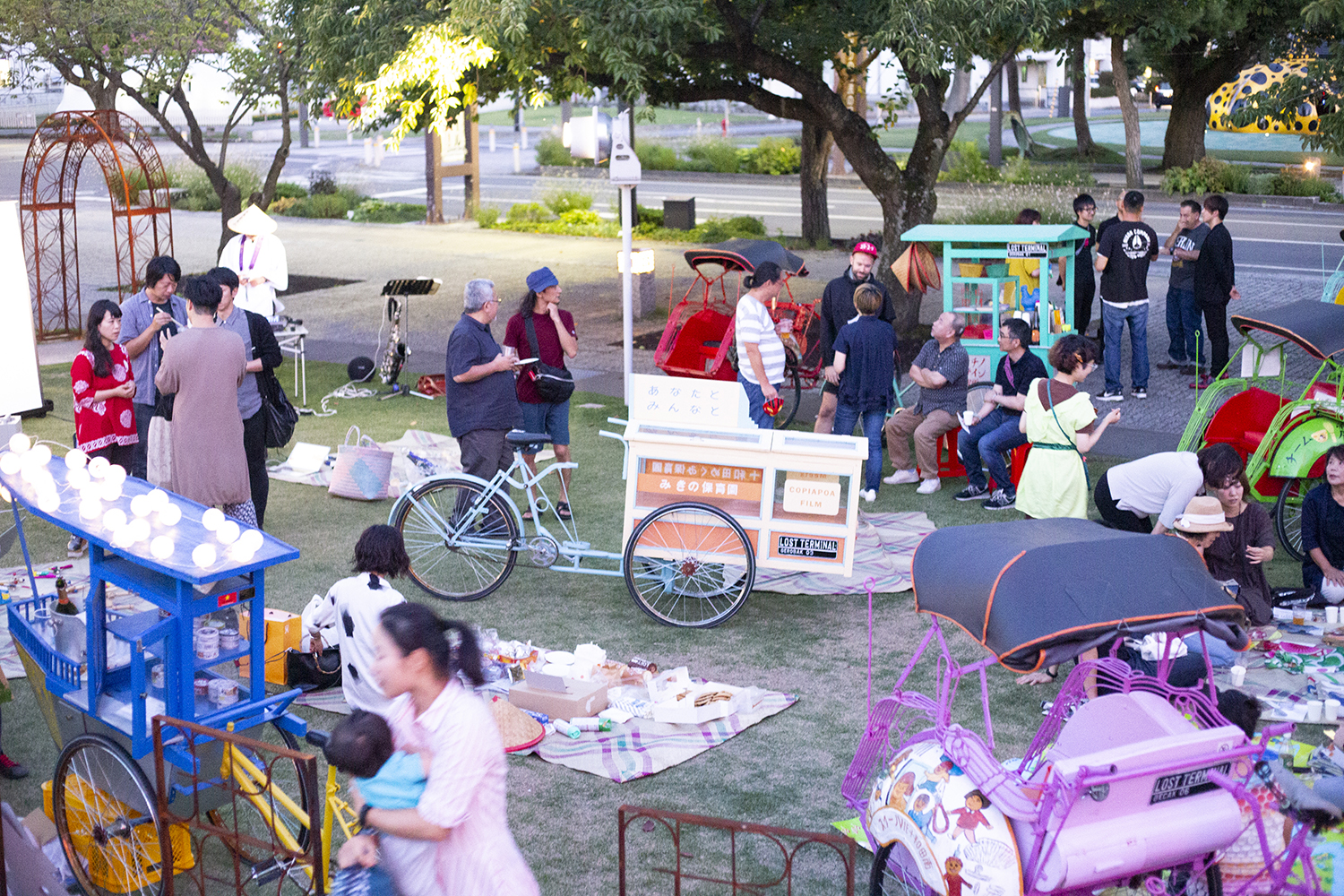
The Message written on a postcard
ポストカードに記したメッセージ
Vehicles of
「ロスト・ターミナル」の
the Lost Terminal.
のりものたち。
They are us.
「ロスト・ターミナル」の
the Lost Terminal.
のりものたち。
They are us.
「彼ら」は「私たち」だ。
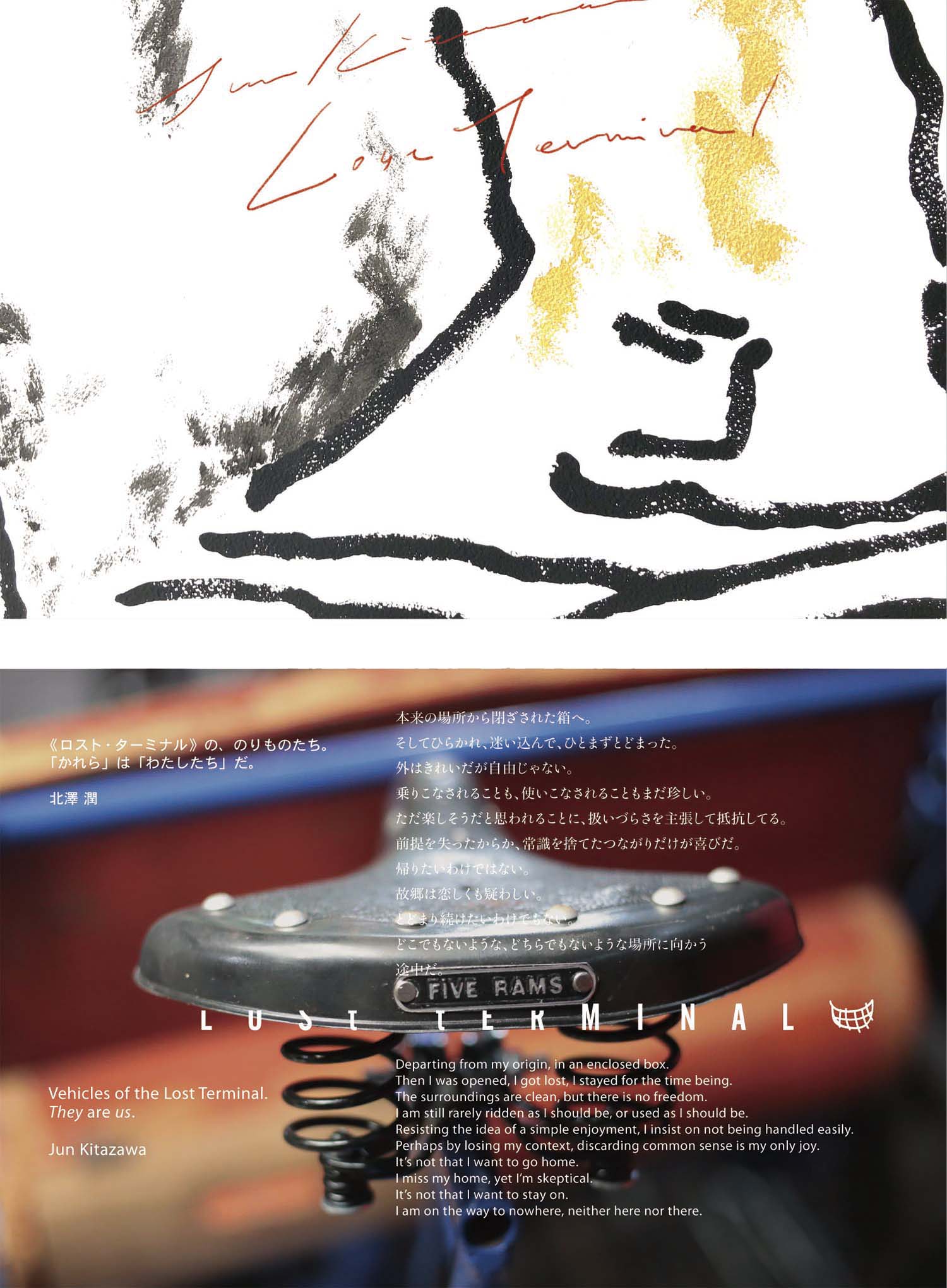
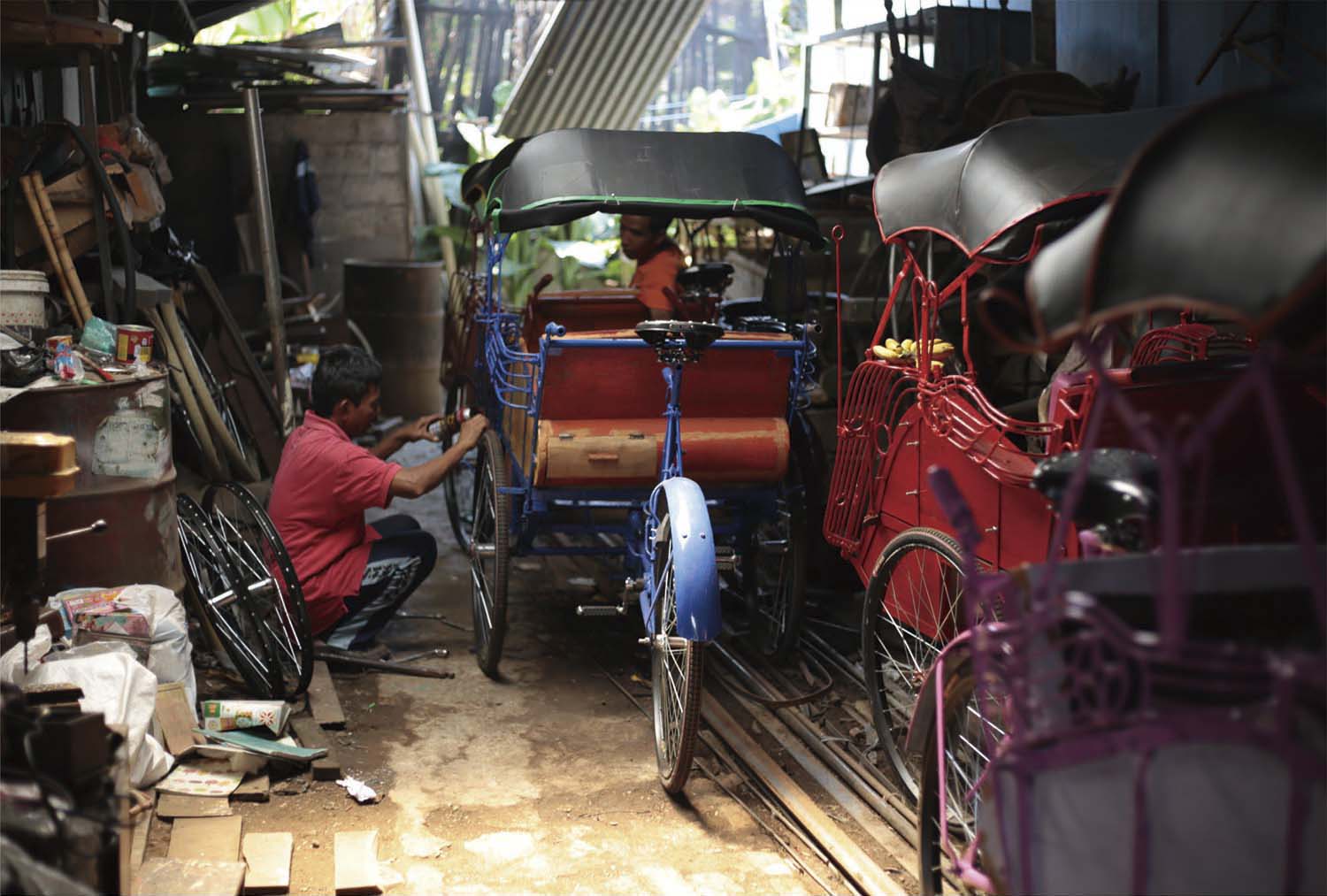
Departing from my origin, in an enclosed box.
Then I was opened, I got lost, I stayed for the time being.
The surroundings are clean, but there is no freedom.
I am still rarely ridden as I should be, or used as I should be.
Resisting the idea of a simple enjoyment,
I insist on not being handled easily.
Perhaps by losing my context, discarding common sense is my only joy.
It’s not that I want to go home.
I miss my home, yet I’m skeptical.
It’s not that I want to stay on.
I am on the way to nowhere,
neither here nor there.
本来の場所から閉ざされた箱へ。
そしてひらかれ、迷い込んで、ひとまずとどまった。
外はきれいだが自由じゃない。
乗りこなされることも、使いこなされることもまだ珍しい。
ただ楽しそうだと思われることに、扱いづらさを主張して抵抗してる。
前提を失ったからか、常識を捨てたつながりだけが喜びだ。
帰りたいわけではない。
故郷は恋しくも疑わしい。
とどまり続けたいわけでもない。
どこでもないような、
どちらでもないような場所に向かう途中だ。
LOST TERMINAL
Towada Art Center Exhibition Stranger Than Fiction
Period : 14 April - 1 September 2019
Location:Towada Art Center, Towada city center street
Project Pertner:Towada Art Center
Special thanks to all members of GRUP HORE
Production cooperated by BECAK SINAR LAUT, ART MERDEKA, PISS ONE IRON ART, Junichiro Endo
Special Supported by Nissho Electronics Cooporation
Supported by Towada Joba Club, MAMA and PAPA, All sponsors of LOST TERMINAL advertisement project
ロスト・ターミナル
十和田市現代美術館 企画展
「ウソから出た、まこと」
期間: 2019年4月14日〜9月1日
場所:十和田市現代美術館および十和田市中心市街地
プロジェクトパートナー:十和田市現代美術館
共同運営:プロジェクトチーム「グルプ・ホレ」
制作協力:ベチャ・シナルラウト、アート・ムルデカ、ピス・ワン・イロン、遠藤純一郎
特別協力:日商エレクトロニクス株式会社
協力:十和田乗馬倶楽部、ママアンドパパ、ロスト・ターミナル広告主のみなさま
十和田市現代美術館 企画展
「ウソから出た、まこと」
期間: 2019年4月14日〜9月1日
場所:十和田市現代美術館および十和田市中心市街地
プロジェクトパートナー:十和田市現代美術館
共同運営:プロジェクトチーム「グルプ・ホレ」
制作協力:ベチャ・シナルラウト、アート・ムルデカ、ピス・ワン・イロン、遠藤純一郎
特別協力:日商エレクトロニクス株式会社
協力:十和田乗馬倶楽部、ママアンドパパ、ロスト・ターミナル広告主のみなさま
